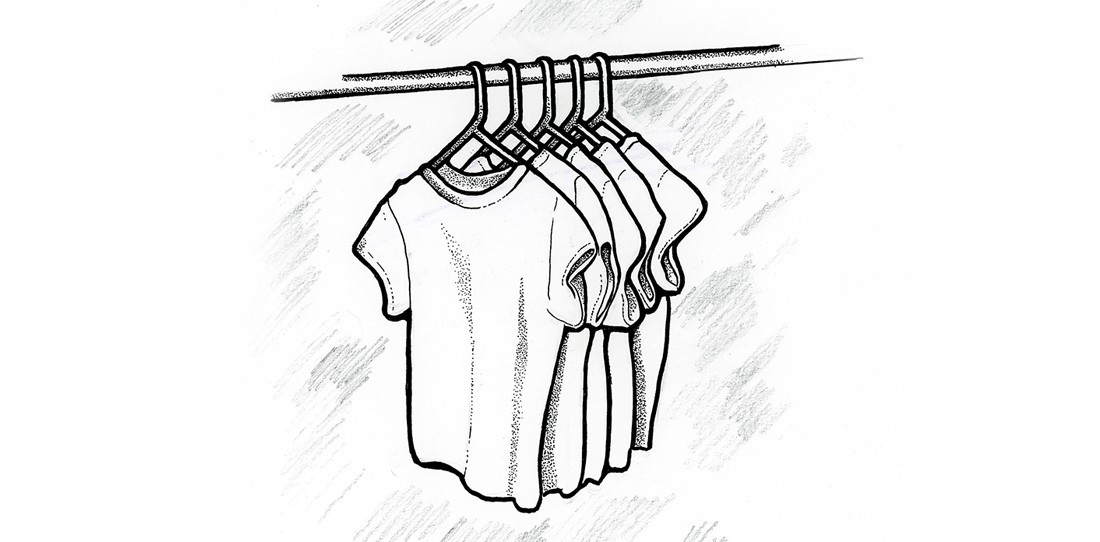Feeding diaspora
Fashioning second skins: food as storyteller
Food is a powerful storyteller, so rich and multi-sensory that the mere image of it brings potent memories and associations. Many diasporic artists work with food iconography and names, because it is an accessible way to communicate cultural identity, lineage, home and double-meanings.
I was initially drawn to Rind, a Winnipeg collective founded in the fall of 2018, for its fruit-related name and strong branding. Rind (Shaneela Boodoo, Brenden Gali, Ally Gonzalo, Nawal Sagher and Yoni Y. Mehari) describes itself as “a pop-up featuring talents from Winnipeg’s BIPOC (Black, Indigenous, People of Colour) community through booze, food and music.”
As the group’s designer, University of Manitoba School of Art student and second-generation Indo-Caribbean artist Shaneela Boodoo creates graphics and event decor for Rind. Her distinct style involves bright imagery, colour-blocking and bold, repeating text in busy but clean layered compositions.
A designer, curator and member of BIPOC collectives Rind and Chroma, Boodoo’s interests in collaboration and community come through in her work.
Boodoo recently spoke with me in person about her work in progress – a line of merchandise she is designing for Rind, tentatively launching in the spring or summer of 2020. Each item will be dedicated to a member of the collective and will amount to a total of four T-shirts and one hat or apron, she says.
The design process begins with a one-on-one interview, in which Boodoo asks each member to share stories about objects from their childhood. Unsurprisingly, food has come up frequently, she says.
“In a lot of BIPOC families, that’s how people connect with each other,” Boodoo says. “For people who were born here in Canada, sometimes that’s the only way you connect to where you’re from.”
Boodoo sees food as an important point of connection between families, friendships and Communities of Colour. While the shirts are highly personal, they also speak to a collective experience, she says.
Brenden Gali’s illustrated shirt is a black long-sleeve with a remixed sardines can on the front and roosters on the sleeves. The symbols are an homage to Brenden’s childhood food favourites (sardines and jasmine rice), attention to packaging and his Chinese zodiac sign, Boodoo says.
In an interview for The Uniter in 2018, Gali explains “the name Rind came out of an idea that, oftentimes in music and poetry, metaphors of People of Colour are related to fruit and how to get the good part of that fruit, you have to get through that built-up, tough exterior. Like fruit, our skin is thick and bitter. Our sweetness earned, not exposed.”
While a fruit’s rind acts as its package, the package of a body is both its skin and clothing.
Fashion is a second skin, communicating identity, lifestyle and values overtly or covertly. Because Boodoo’s merch is intimately customized with biographical cultural imagery and, in some cases, non-English text, their context must be understood.
“When you’re putting these things out, it’s not like art on a wall, it’s clothes to wear – and people want to wear something that looks cool, but I put a lot of time and care into how I’m telling this through design, so I want people to know that,” Boodoo says.
To extend the merch’s significance, each item is accompanied by a brief anecdote, Boodoo explains. Although art speaks for itself, I see this added element as a way of generously encouraging more mindful engagement, as well as offering another avenue for BIPOC connection and community-building.
Rind’s new line by Boodoo represents diasporic kinship, relationality, storytelling and cultural pride. Boodoo feels honoured with Rind’s vulnerability and trust, she says.
“The process has been very back and forth. I want it to feel like an invitation.”
Christina Hajjar is a first-generation Lebanese-Canadian Pisces dyke ghanouj with a splash of tender-loving rose water and a spritz of existential lemon, served on ice, baby. Catch her art, writing and organizing at christinahajjar.com or @garbagebagprincess.
Published in Volume 74, Number 19 of The Uniter (February 27, 2020)







